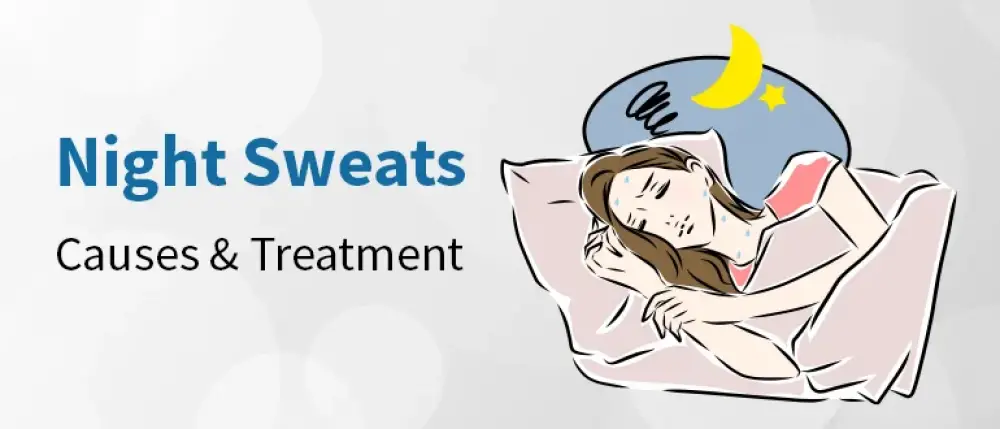Subscribe to get weekly insights
Always stay up to date with our newest articles sent direct to your inbox
Published on 1 Sep, 2023
Updated on 25 Nov, 2023
9703 Views
4 min Read

Written by Care Health Insurance
favorite0Like
favoriteBe the First to Like
Have you ever awakened in the midst of your sleep, and find yourself drenched in sweat and gasping for breath? Although, this can be a normal situation if you are sleeping in an uncomfortable environment, or if you are having fever or any other temporary illness. But if you are persistently encountering this sort of midnight blues, it might be a symptom of a possible health issue or an ailment.
Night sweats or ‘sleep sweat’ refers to a peculiar health issue that results in drenching of the body in sweat at night. The issue is commonly persistent among women in their 30s and early 40s.
This phenomenon of sweating is a response to the hot flashes that cause a sudden heat wave throughout the body. Sweating gradually cools down the body by lowering your body temperature to a safe and comfortable level.
However, the persistence of such a situation can be frightful as it may cause insomnia, depression and other mental issues as well.
Following are being the main causes of night sweats:
Hormonal change in the female reproductive system, especially oestrogen and progesterone is the main cause for night sweats in women. These abrupt hormonal changes result in abnormal fluctuations in body temperature especially at night. As a response to this stimulus, the night sweats occur. However, excessive sweating can be a cause of worry as it can hint towards a possible critical illness.
In normal situations, work-related stress can affect your mental peace, thereby disturbing your sleep cycle. However, if you're constantly suffering from anxiety or depression, you are more likely to experience night sweat while sleeping. Sometimes, the stress due to work or a crisis revs up your mind during sleep, causing you to perspire and wake up at midnight.
Sometimes, a wrong selection of night-suit or even an uncomfortable mattress hinders your skin to ‘"breathe’" properly, thereby causing too much sweat while sleeping.
It is always advised to wear cotton sleepwear that lets your whole body breathe properly and choose the right type of mattress for sound sleep.
During pregnancy, the female body undergoes abrupt hormonal shifts. This is why many women experience mood swings and night sweats. A recent survey by the National Library of Medicine, Biotech Information (USA) suggests that above 33 percent of women experience night sweats in the prenatal stage (before childbirth), while 29% experience in the postpartum (after childbirth) stage.
Among the two conditions, the prenatal night sweats commonly happen during the following stages:—
Sometimes, the sleep sweat may persist even a few weeks post your childbirth, because it takes time to adjust the hormonal level to their pre-pregnancy normal range.
So, there is absolutely no need to worry if you are facing night sweats throughout the period of pregnancy as this is nature's way of controlling your pregnancy temperature.
Mostly, the night sweats occur during the successive stages of perimenopause and menopause.
If you are persistently facing the problem of night sweats, it might be a symptom of a possible medical condition or a critical ailment such as the following:
It is true that sometimes the night sweats can be symptoms of some particular types of cancers. Here are different types of cancers that involve night sweats as symptoms:
Thus, the occurrence of night sweats might be a symptom of one of the types of cancers mentioned above. Now, an obvious question arises—
For such an unwanted situation, you must already have adequate cancer coverage. The skyrocketing medical treatment costs has made health insurance quite essential for every household. Especially, the expenses involved in cancer treatment can drain all your savings if you do not have adequate health coverage.
A cancer specific plan works on the principle of fixed-benefit plan, where a lump sum amount is provided towards treatment. The granted amount can be utilised in paying off the liabilities.
In this regard Care Cancer Mediclaim plan can be a good option to consider. With comprehensive cancer coverage, you can prevent depletion of your savings due to hefty hospital bills. Starting from covering the hospitalisation expenses to other related expenses, the policy proves as a boon in the time of need.
>> Also Read: Cancer Treatment Cost in India
Disclaimer: Verifying the policy details and coverage with the official policy documents is essential. Also, kindly consult a professional medical expert to verify the details of health concerns.
favoriteBe the First to Like
Thyroid : मामूली नहीं हैं महिलाओं में थायराइड होना, जानें इसके लक्षण और घरेलू उपचार Vipul Tiwary in Diseases
शुगर कंट्रोल कैसे करे? जानें, डायबिटीज में क्या खाना चाहिए Vipul Tiwary in Health & Wellness
हाई ब्लड प्रेशर को तुरंत कंट्रोल कैसे करें? देखें इसके उपाय Vipul Tiwary in Diseases
पैरों में दर्द किस कमी से होता है? जानें, इसके घरेलू इलाज Vipul Tiwary in Health Insurance Articles
Smog Season is Back: Are You Really Safe? Sejal Singhania in Health Insurance Articles
Amino Acids: The Unsung Heroes of Your Mental Well-being Jagriti Chakraborty in Mental Health
8 Reasons to Start Your Morning with Ajwain Water Jagriti Chakraborty in Home Remedies
Ice Water Face Dip: The 15-Second Beauty Hacks Celebs Swear By Jagriti Chakraborty in Home Remedies
Always stay up to date with our newest articles sent direct to your inbox
Loading...